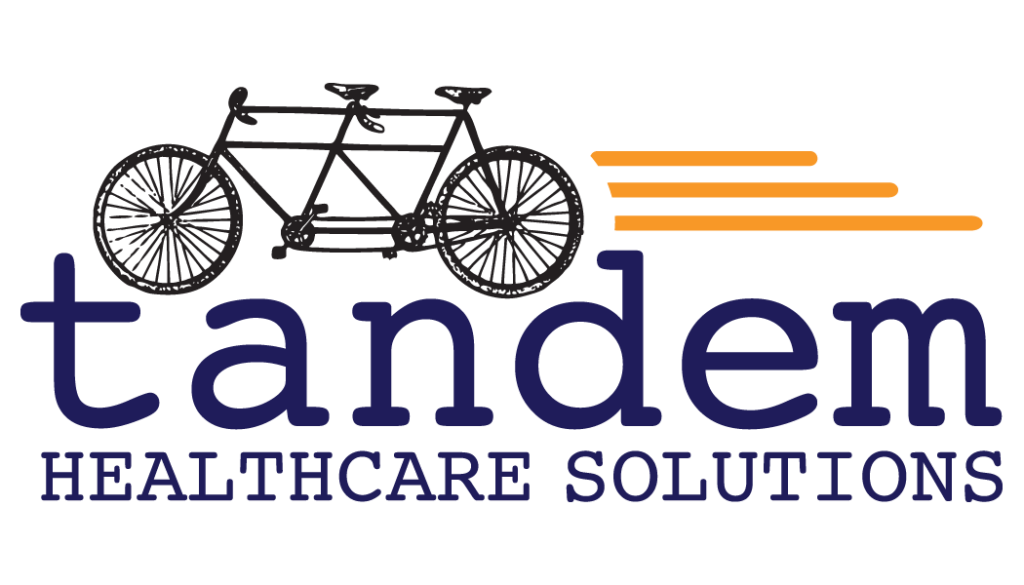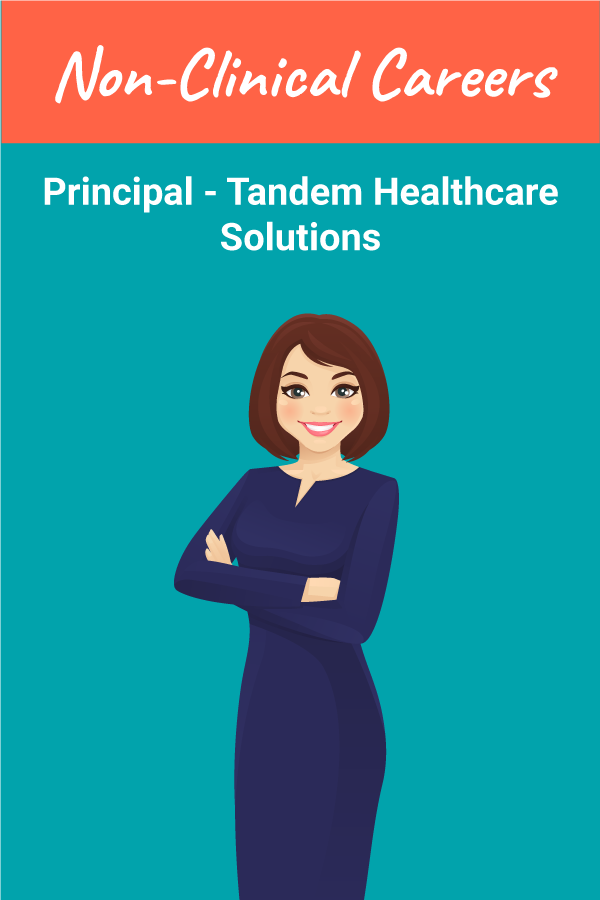This week’s spotlight is on Allison Chrestensen, an occupational therapist who pursued public health—and now runs a business teaching creative and contemplative practices to healthcare practitioners to improve wellbeing and help prevent burnout.
This post may contain affiliate links or codes. This won’t increase your cost, but it helps keep TNCPT alive, and free of annoying ads! Thank you for your support. 🙂
What is your full name and title?
Allison Chrestensen, MPH, OTR/L
Principal, Tandem Healthcare Solutions

Where did you go to OT school, and what year did you graduate?
Medical College of Georgia, 1999
What did you do when you first finished school, and for how long?
My first job was in a small, rural hospital (a critical access hospital) working as an OT in the SNF & swing bed units.
I was the only OT on staff, and since we were the only hospital in a 30-mile radius, my caseload was extremely diverse—adult and geriatric (even a few pediatric) patients with a variety of diagnoses. Entering this role as a new grad, this was extremely intimidating for me, and I remember thinking, “Ooooh! This is what the expression ‘sink or swim’ means!”
Since there were so few of us on staff at the hospital, we were a very close-knit group, even across disciplines. That taught me about the power of a multi-disciplinary team that is open to the different perspectives, gifts, and lived experiences of its team members.
What did you do after that, and for how long?
My second job was case manager for the neurological rehab team at a 200-bed community hospital. It was a part-time position, so I picked up extra hours where I could find them—in early intervention (pediatric home health), acute care, and skilled nursing facilities. Eventually the rehab department needed someone to get trained in Complete Decongestive Therapy, and I agreed to be “the lymphedema person.”
What did you enjoy about your early roles? What didn’t you enjoy?
I worked as one of two oncology rehab therapists at our hospital for several years. Because many of my patients were navigating chronic illness and end-of-life questions (and I developed trusting relationships with many of them), this area of practice was very emotionally challenging for me.
I loved the intensity and the tenderness of the work. At the same time, I felt like I was drifting on a roiling sea, completely alone.
Many of my patients wanted to have heart-to-heart conversations with me about their experiences with illness and how to move forward with their lives, given the identity changes that cancer and traumatic illness can bring. I felt honored to be entrusted with these delicate conversations—yet, at the same time, ill-prepared to have them.
I remember feeling desperate for resources on how to be present for people facing these questions and questioning why my training hadn’t prepared me for this part of my role that is so central to my practice. It’s only since I left practice that I’ve begun to process these experiences and acknowledge the weight of the stories I’ve carried by myself all this time.
What are you doing these days?
After about four years in oncology/lymphedema practice, I felt constantly exhausted and knew that, for the sake of my own well-being, I needed to create some new opportunities for myself.
I’d always known I wanted to teach healthcare professionals and that I would pursue a master’s degree that would allow me to build upon my clinical experience.
I began my Master’s of Public Health program, with concentration in Health Policy and Administration, at the University of Georgia in 2006. While in graduate school, I balanced research and teaching graduate assistantships with working part-time in lymphedema/oncology practice at the hospital.
After completing my graduate program, I decided to move from Athens, GA to the Research Triangle Region of NC. I knew I was ready to leave clinical practice and that I needed a change of scenery to make this new start in my professional life.
I joined the faculty of the Academy of Lymphatic Studies and began teaching 135-hour Complete Decongestive Therapy certification courses to PTs, OTs, and massage therapists.
To tide me over while I searched for a public health position, I took an OT job in a private outpatient clinic. As soon as I began my position there, I realized that working in the community hospital in Athens had shielded me from many of the harsh realities my fellow therapists face.
In my new job, I was presented with one moral dilemma after another.
My schedule was double-booked with lymphedema and oncology rehab patients, despite the fact that these patients were high-acuity, and many of them required manual treatment. I learned early on that maximizing reimbursable visits was prioritized over quality patient care.
Additionally, my work was supervised by a Physical Therapy Assistant who reviewed my treatment plans and documentation and provided feedback to the practice owner, an OT.
My concerns that this system of supervision was not supported by the PT or OT practice frameworks and codes of ethics went unacknowledged. Ultimately, my disagreements with the clinic owner and my PTA “supervisor” turned to overt bullying.
Wow. That’s horrible. Dare I ask what happened next?
During my annual review, I sat stone-faced and numb as they told me that I was an incompetent therapist and that my patients didn’t like me.
This is perhaps one of the hardest things I experienced as a healthcare professional—having my emotional core exposed in this way and then, without a pause to collect myself, going into the next patient encounter with a smile on my face.
I was beginning to doubt my own sanity, competence, and judgment and I knew that something in my core had shifted in an irreversible way. I resigned the following week.
What did you do next? I can feel this is all building toward something!
Once again, I found myself piecing together work in pediatric home health while conducting an intense job search.
I cried every day and experienced crippling anxiety and insomnia for about nine months. I was desperate and broken. Sitting in stillness, I gained clarity and a new sense of purpose for going after what I wanted—to teach.
Oooh, do tell…is this when you went into non-clinical work??
Yes! After about nine months, I found a Health Education Specialist position at a Quality Improvement Organization. My job was to design and deliver training programs for Medicaid Waiver adult homecare services providers.
I was later promoted to Assistant Manager of Home and Community-Based Services, where I supervised nurses who conducted ADL assessments to qualify Medicaid recipients for homecare services. During my time at the QIO, I was exposed to the diverse world of quality in healthcare.
When I learned about Patient and Family Engagement (PFE), I thought it sounded like the perfect complement to my experience as an OT.
OK, this sounds like a dream job! But you’re in a totally new role now. Can you share why?
Unfortunately, I became ill a few months later and ended up in the cardiology floor at Duke University Hospital.
That experience taught me a lot about what it is like to lose all sense of control due to illness. Suddenly, I understood in a new way some of the same existential questions my patients had wanted to explore with me.
My lived experience as a patient reinforced my desire to teach clinicians the importance of a patient-centered approach.
Through the Institute for Healthcare Improvement, I had the good fortune to connect with a colleague who was doing Patient and Family Engagement (PFE) work at Duke University Health System. We worked together to build and evolve the Patient and Family Advisor Program across the health system.
Ultimately, we designed several courses on building models for partnership with patients and families and, through the Hospital Improvement and Innovation Network, worked with hospital associations in several states around the country to train and coach hospitals on our approach.
This is fantastic work! Yet, I keep wondering when Tandem Healthcare Solutions comes in 🙂
I absolutely loved my work in PFE and patient experience and yet, as time went on, I found myself asking how we in healthcare could be so singularly focused on the patient experience with little attention given to the experience of the people providing the care.
It felt to me that the pendulum had swung too far in one direction, and that healthcare professionals were continually expected to do more to provide a better experience for patients, no matter the cost to their own well-being.
It seemed only logical to me that the patient experience and the staff experience are intertwined.
So, my interests began to shift toward working on burnout and “joy in work” for healthcare professionals. Through my work at Duke, I was exposed to narrative medicine and incorporating arts and humanities into medical training. I was inspired…and in love. It felt to me that these practices were just the thing I’d been missing during my own clinical years.
As I pursued additional training in mindfulness, narrative medicine, and mindful self-compassion, I realized that most burnout research and interventions were targeted toward physicians, and that these interventions needed to be spread to my non-physician colleagues.
YES! So, what does Tandem Healthcare Solutions do?

Through my business, Tandem Healthcare Solutions, I offer keynotes and workshops that help healthcare professionals engage in creative and contemplative practices (mindfulness, narrative medicine, and mindful self-compassion) to facilitate more meaningful interactions with patients, to cultivate personal well-being and to promote more cohesive teams.
I developed my own workshop, Replenishing the Well, which is tailored to allied health professionals who are experiencing emotional fatigue and are at risk of burnout. I’ve just finished re-working the format from an in-person experience to a virtual one.
In recognition of the extraordinary work healthcare professionals are doing during the COVID-19 pandemic, I’m offering free virtual sessions to healthcare practitioners from all disciplines.
I also serve as an instructor for Duke University’s Reimagine Medicine Program, an immersive arts and humanities program for pre-medical students.
Now I’m working where I feel most at home, in the allied health community, to teach practices that have helped transform my own well-being through my experience with illness and burnout.
So, finally, my work has come full circle, and I know I’m where I’m supposed to be.
Are you still treating patients, or are you solely non-clinical?
Solely non-clinical
Did you get any special certifications or training along the way to help you get into your current role?
- Certified Health and Wellness Coach through Wellcoaches (I’d recommend this training for ANY healthcare professional)
- Narrative Medicine: Columbia University (CEU course)
- Mindful Practice Facilitator Training: University of Rochester
- Motivational Interviewing
When did you start your business?
I started taking freelance work in 2015 while I was still working as a permanent employee. I incorporated my business in 2017 with a PFE focus, and shifted my business model to focus on burnout and joy in work in 2018.
What types of products or services do you offer?
I offer Replenishing the Well keynotes and workshops that help healthcare professionals engage in creative and contemplative practices (mindfulness, narrative medicine, and mindful self-compassion) to facilitate more meaningful interactions with patients, to cultivate personal well-being and to promote more cohesive teams.
I also offer Mindful Practice workshop modules that utilize mindfulness and narrative medicine practices to help healthcare professionals explore topics meaningful to their work such as uncertainty, grief and loss, resilience, and teamwork.
How did people react to your unconventional career path?
Most people have been extremely supportive of my career path, winding though it has been. I’m my own worst critic.
What’s a typical day or week in the life like for you? What types of tasks and responsibilities fill your time?
I’m fortunate to work from home, so I have a great deal of flexibility in scheduling my day. Mornings are my most productive times, and I find that starting my day with meditation helps me to focus and see my way more clearly through some of the challenges that come with being an entrepreneur.
Most days, I also reserve an hour or so for reading books and articles that will help to further my work and doing some professional writing. Most of my content development and course prep happens in the mornings, since that’s when I’m most productive.
I try to schedule meetings in the afternoons, after the creative juices have waned.
What are some of the challenges of your role? What are the rewards?
Being a home-based entrepreneur can be isolating, so I have to find ways to engage with colleagues to continue generating new ideas and keep my finger on the pulse of the healthcare field. A colleague friend and I get together a couple of times a month to brainstorm, talk through challenges, and write, which helps to keep me honest.
I’m also a member of a Mindful Justice-Based Practice book club, which has taught me a lot about bridging different perspectives and establishing a reciprocal relationship in teaching and learning.
The lack of structure is also challenging, particularly for a clinician who is accustomed to having every hour of the day scheduled.
I love that my work affords me the space and freedom to be creative and to feel into what’s possible. I love collaborating with colleagues to teach and write and learning from the people I teach.
How do you think working as an OT prepared you for this role? Which skills transferred?
Teaching has always been my favorite part of my job as an OT. Breaking down complex tasks into manageable steps has served me well in teaching.
Do you work remotely or on-site?
Both. I do virtual coaching. Classes are delivered on-site.
Did you read any books, take any courses, or do anything special overall to get you where you are today?
The University of Rochester Mindful Practice Program was a fantastic experience for helping me to process through many of the experiences I had as a clinician. It also reinforced the importance of including creative and contemplative practices in our work. I loved it so much I trained as a facilitator for the curriculum!
Wellcoaches has a fantastic virtual learning program in health and wellness coaching. I’d recommend it to any healthcare professional!
What would you recommend to someone who is considering going into a role like yours? Do you have any special words of wisdom for the readers?
As therapists, our training goes beyond musculoskeletal anatomy and kinesiology. Our understanding of the complexities of functioning and being in the world enables us to interact on a deeper level with fellow humans.
That knowledge transfers easily even to non-clinical roles. Your experience has given you a deep level of wisdom that few people have and would be a uniquely valuable contributor to any non-clinical team.
If you could give yourself one piece of career advice you wish you had during your OT school program, what would it be?
To allow myself to feel “all the feels”. Working in PT/OT/SLP comes with great rewards, and unique challenges.
While we often celebrate the things that go well, we’re not conditioned take the time to grieve our losses or to express our anger and frustrations in a meaningful way. Acknowledging and working through those feelings makes us better practitioners and better people in the world.
If you could teach anything to today’s graduate students in your profession, what would it be?
Self-care skills. As people who are carers at heart, it’s easy for us to neglect our own wellbeing so that we can go the extra mile for others. Unfortunately, the health care system reinforces that tendency.
If we are to thrive in this dysfunctional environment, we have to prioritize self-care both on and off-shift.
Thanks for your insight, Allison!
Want to explore the world of health coaching and lifestyle medicine—and get some CEUs in the process? Check out MedBridge’s Introduction and Basic Skills in Lifestyle Medicine Certificate Program! (Save 40% on unlimited CEUs from MedBridge with my discount code: TNCPT)




